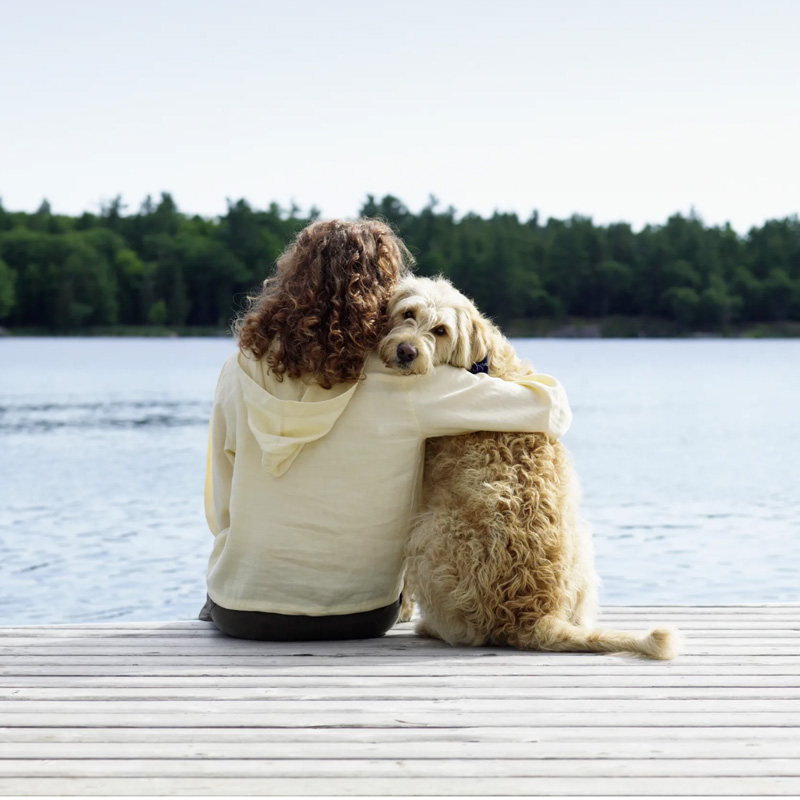
If you have a dog that is mourning the death of an animal friend, there’s a grieving process.
“Dogs are highly social, some of the most social mammals in the world. And as mammals, they share much of the same neurobiology and physiology that drives our own emotions.”
Certified Applied Animal Behaviourist and best-selling Author – Patricia McConnell
A recent study revealed that 86% of dogs that lost a canine companion showed signs of deep grief for months.

Signs that your dog may be grieving –
Signs that may indicate that your dog is grieving, (although each dog processes a sense of loss differently). You may not see all of these signs.
- loss of appetite
- lethargy and depression
- wakefulness—or the opposite—sleeping more than usual
- accidents in the house
- acting up- i.e. behaviour issues
- separation anxiety
- vocalisations—not necessarily barking, but howling, whimpering and whining.
- personality changes (This seems especially true if the dog is grieving for another animal and he’s not sure what his role is now that his friend is gone.)
HOW CAN WE HELP?
Recognise that your dog may be grieving. It’s very important that you honour and respect what your canine friend is going through by letting him know you understand and are there for him.
Look after your dog’s physical needs. Be aware that prolonged grieving can often cause physical problems that need to be addressed. As with people, the mental, emotional and physical facets of a dog are all connected.
Do whatever you can to bond with him- i.e. special outings, letting him sleep on the bed with you, snuggle time on the couch, special healthy treats, etc.
Stick to a routine that will help him feel secure. Whatever loss he’s experienced has caused him to feel like he doesn’t know what to expect any more and it’s your job to reassure him that all is well by being consistent.
Add a bit more exercise and stimulation to his life. The physical activity will help him feel more settled in his feelings.
Don’t be a helicopter friend. Hovering and playing the “you poor baby” game with a dog that is grieving only intensifies the grief and isn’t helpful. You can certainly be sympathetic, but it’s better to say, “You’re ok. I’m here for you,” than to feel sorry for him in any kind of dramatic way.
If your dog is experiencing grief because of the loss of an animal companion be careful about introducing a new dog into the family right away. I can’t tell you how long to wait because each situation is different, but don’t expect that getting him a new friend immediately will work miracles. Put yourself in his place: if a friend, family member, partner or spouse dies, you don’t rush out and find another person to replace the one who died. You need time to process your grief.
If your dog (and in this case it’s probably a new dog to you) is grieving because his person died or went into assisted living, or perhaps his people divorced, moved, or are unable to care for him for whatever reason, it’s important that you don’t try to replace that person (or people) but instead form a new relationship with your dog. Again, I’ll ask you to relate to a people situation: if you begin a relationship with a person who is grieving for someone who doesn’t exist in his/her life any longer, you wouldn’t try to replace that person would you? You would (I hope) honor the role the person who is no longer there played in the life of your significant other or friend and then you’d move on together.
Helping a dog grieve is tricky because on the one hand, dogs live in the moment so they’re very capable and willing to be fully present in their lives. But, because time is a relative concept in the life of a dog sometimes the moments aren’t always right now but yesterday … or last week … or last month. The imprints of the past often stay with them and it’s up to you to help them erase the sadness and replace it with happy moments. The only way to fill a black hole is to let the light in. Help your dog make new memories.
Finally, be patient. It make take weeks, or even months for your dog to emerge from grief. Just hang in there and honour the process by allowing him to make sense of it all in his own time with your help. Grieving is his way to honour his friend—human or animal—just as it is with people, so allow him the time and space to do that. One thing you have going for you here is that dogs are willing to trust you to help them trade sadness for happiness. They want to be well—on all levels—so grieving isn’t something they enjoy or want to prolong for any length of time.


This is so beautiful!! I am drawn to it because my daughter has two dogs and one is now 14 and may not be with us for much longer.
The other girl is younger and we have already began to worry about she will deal with the loss of her best friend.
We will also be grieving the loss of our much loved boy.